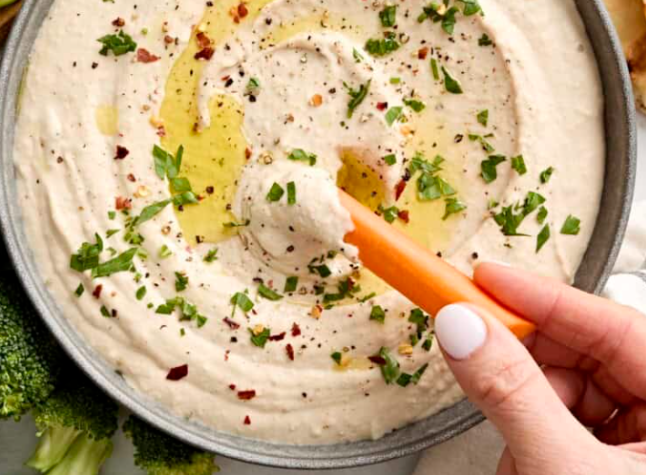
White Bean Hummus: A Creamy, Delicious, and Nutritious Recipe
When most people think of hummus, they imagine the traditional Middle Eastern dish made from chickpeas, tahini, olive oil, lemon, and garlic. While chickpea-based hummus is a classic that deserves all its praise, there’s a lesser-known alternative that’s equally delicious: white bean hummus. Made from creamy cannellini or great northern beans, white bean hummus offers a unique twist on the traditional recipe, bringing subtle flavors, smoother texture, and plenty of nutritional benefits.
White bean hummus is incredibly versatile, easy to make, and can be customized with various spices and add-ins to suit your personal taste. It’s an excellent dip for vegetables, a spread for sandwiches, or a flavorful side to complement any meal. Let’s dive into the recipe, nutritional benefits, and some tips for customizing your white bean hummus.
Ingredients for White Bean Hummus
To make a basic white bean hummus, you’ll need the following ingredients:
- 1 can of white beans (cannellini or great northern beans, drained and rinsed)
- 2 tablespoons tahini (a paste made from ground sesame seeds)
- 2 cloves of garlic (more or less depending on your garlic preference)
- 2 tablespoons olive oil (extra virgin for best flavor)
- Juice of 1 lemon (about 2 tablespoons)
- ½ teaspoon ground cumin (optional, but adds a warm, earthy flavor)
- Salt and pepper to taste
- Water (as needed, for thinning)
Instructions
Step 1: Prepare the Beans
Start by draining and rinsing the canned white beans. Cannellini beans and great northern beans are ideal because they have a creamy texture that blends well into a smooth hummus.
Step 2: Blend the Ingredients
In a food processor or blender, combine the white beans, tahini, garlic, olive oil, lemon juice, and cumin (if using). Blend until smooth and creamy. Depending on the power of your food processor, this may take a few minutes. You might need to stop and scrape down the sides of the processor to ensure all ingredients are well incorporated.
Step 3: Adjust the Texture
If the hummus is too thick, you can add a little water, one tablespoon at a time, and blend again until you reach your desired consistency. The final texture should be smooth and creamy, with no visible lumps.
Step 4: Season to Taste
Taste your hummus and adjust the seasoning. Add salt, pepper, or more lemon juice depending on your preferences. You can also drizzle a little extra olive oil on top for a richer flavor.
Step 5: Serve and Enjoy
Your white bean hummus is now ready to serve! It pairs beautifully with freshly cut vegetables like carrots, cucumbers, or bell peppers. It’s also great as a spread on sandwiches, a topping for salads, or even alongside grilled meats or falafel.
Nutritional Benefits of White Bean Hummus
White bean hummus is not only delicious but also packed with nutrition. Let’s take a look at some of the benefits:
- High in Fiber
White beans, like chickpeas, are rich in dietary fiber. One cup of white beans contains around 11 grams of fiber, which helps promote healthy digestion, regulates blood sugar, and supports heart health. This makes white bean hummus an excellent option for those looking to increase their fiber intake. - Rich in Plant-Based Protein
White beans are also a great source of plant-based protein, making this hummus a satisfying snack or meal addition for vegetarians and vegans. One cup of white beans contains about 15 grams of protein, which helps in muscle repair, immune function, and overall body maintenance. - Packed with Vitamins and Minerals
White beans are loaded with essential vitamins and minerals, including iron, magnesium, potassium, and folate. These nutrients support various bodily functions such as red blood cell production, bone health, and energy metabolism. - Low in Fat and Calories
If you’re watching your fat or calorie intake, white bean hummus is a smart choice. While it still contains healthy fats from the olive oil and tahini, it’s lower in calories than some other dips or spreads. The beans themselves are naturally low in fat, making this hummus lighter than chickpea versions, which can be slightly denser due to chickpeas’ higher starch content. - Gluten-Free and Dairy-Free
White bean hummus is naturally gluten-free and dairy-free, making it a perfect option for those with specific dietary restrictions or preferences. It’s a great addition to a variety of diets, including vegan, vegetarian, paleo, and gluten-free.
Customizing Your White Bean Hummus
One of the best things about white bean hummus is its versatility. While the basic recipe is delicious, you can get creative by adding different herbs, spices, and flavorings. Here are a few ideas to inspire your culinary experimentation:
- Herb-Infused Hummus
Fresh herbs can bring a burst of flavor to your hummus. Try adding a handful of fresh parsley, cilantro, or basil to the food processor. Herbs not only brighten the flavor but also add extra antioxidants and nutrients. - Spicy White Bean Hummus
If you enjoy a bit of heat, spice up your hummus by adding red pepper flakes, cayenne pepper, or a dash of hot sauce. You can also blend in roasted red peppers or harissa (a North African chili paste) for a smoky, spicy kick. - Roasted Garlic Hummus
Roasting the garlic before blending it into the hummus can give it a deeper, caramelized flavor. Simply roast a whole garlic bulb in the oven (wrapped in foil and drizzled with olive oil) until the cloves are soft and golden brown. Use the roasted garlic in place of raw garlic for a more subtle, savory taste. - Sun-Dried Tomato Hummus
Sun-dried tomatoes can add a tangy, slightly sweet flavor to your white bean hummus. Blend in a few pieces of sun-dried tomatoes along with the other ingredients, or stir in chopped sun-dried tomatoes at the end for a chunkier texture. - Lemon and Dill Hummus
For a refreshing, zesty twist, add extra lemon juice and a tablespoon or two of chopped fresh dill. This version pairs especially well with seafood or as a dip for cucumber slices and pita chips. - Olive and Feta Hummus
For a Mediterranean-inspired variation, blend in a handful of pitted Kalamata olives and crumbled feta cheese. This hummus is packed with savory, briny flavors and works well as a spread on wraps or sandwiches.
Storing White Bean Hummus
White bean hummus can be stored in an airtight container in the refrigerator for up to 5 days. If it thickens too much during storage, simply stir in a little water or olive oil to loosen it up before serving.

